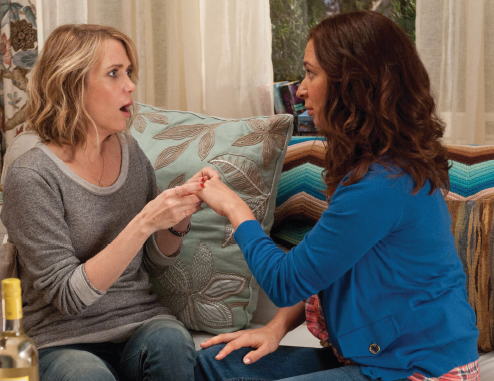Apology
When Lillian is missing on the day of the wedding, Helen seeks Annie’s help to find their friend. Annie resists, but they are eventually able to work together once Helen begins to admit that she has been behaving badly. To apologize is to admit wrongdoing and take responsibility for your own role in the conflict. It can often be difficult to apologize, because it means swallowing your pride and confessing that you did something wrong. Helen hates admitting it, but she acknowledges that she hurt Annie by putting distance between Annie and Lillian. The apology may or may not be accepted (Annie doesn’t want to hear it at first), but when we hurt others, acknowledging it and expressing our regret and remorse can go a long way toward repairing the damage (Donnoli & Wertheim, 2012). Annie and Helen do eventually experience a reconciliation that may lead to the beginnings of friendly interactions between them.
An important part of taking responsibility is to recognize how our conflict styles or behaviors might be affecting the other person. Metacommunication, or communicating with each other about how we communicate, can help us become more aware of our own communicative missteps in relationships (Acitelli, 2008). Your best friend might tell you, for example, that “When you yell at me, I don’t hear what you are saying because I’m so afraid of you.” You might respond, “I don’t mean to yell—

How do you know when it is time to apologize? Your friend or relational partner may well demand it from you directly, particularly if you’ve done or said something seriously hurtful (Theiss, Knobloch, Checton, & Magsamen-
Canary and Lakey (2012) argue that when relational breaches are very serious, only a “complete and heartfelt” apology from the offender offers any hope for the relationship to continue. For Annie and Lillian, Annie’s destructive meltdown at the bridal shower led Lillian to break off the friendship and disinvite Annie to the wedding. The two are only able to repair their friendship when they both apologize: Annie freely admits that it was her fault (including her “mental problems”), but Lillian also apologizes for acting hastily in the heat of the moment to kick Annie out of the wedding.
There are times, however, when the hurt is too deep even for a sincere apology to be able to repair the damage. In that case, the relationship may end in separation. For it to continue, the offended partner often must be willing to accept the apology and begin to forgive the transgression.
AND YOU?
Question
Consider the most serious situation you’ve faced in which you had to offer an apology. What events and feelings led up to your decision to apologize? How did you feel before the apology and after? Do you believe that the apology affected the outcome of the relationship? If so, how?